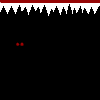The priority of this run is to finish a game of chess against the
default level opponent in the least number of moves possible.
Objectives
- Emulator used: FCEUX 2.1.4a
- Aims for fastest time to checkmate
- Uses a suboptimal opening move to be made so that any opening books preprogrammed into Battle Chess will be obsolete.
- Manipulates computer analysis through blunders
- Minimizes piece exchanges as to cut out fight scenes
My first tactic was to open with a move to quickly render the
engine's opening book void. There were several candidates for this
including the moves 1. g3, 1. h3 etc. Using these lines I opted for
quick advancement for one of my bishops and queen due to the large
amount of board that they need to cover quickly.
During the first tryout of this game I was able to checkmate in
less than 12 moves using Rybka 4 (the best chess engine software to
date) and repeatedly trying to blunder the opponent until a quick
checkmate.
One thing that limited and quickened a last exhaustive search for a
win is that the opponents choice of a move never changes for a
certain situation. I limited my search tree to 5 branches per move
(choosen by Rybka) so 5 choices ^ 8 moves = 400000 possible lines.
I pruned out those moves that held many piece exchanges, those that
did not advance either the queen or bishop, and those that led to
useless moves like castling my king or advancing both knights, or
advancing more than 3 pawns. This left me with about 13 hours of
searching by hand with a little lua script help to take away action
scenes.
When I was finished I had three possibilities for a mate in 8 moves.
One consisted of 4 piece exchanges() and the other two had 3. Those two were
1. g3 e5 2. Nf3 Nc6 3. d4 Nxd4 4. Nxe5 Bc5 5. e3 Nf5 6. Bc4 f6 7. Qd5 fxe5 8. Qf7# in 15883 frames
and
1. h3 e5 2. Nf3 Nc6 3. d4 Nxd4 4. Nxe5 Bc5 5. e3 Nf5 6. Bc4 f6 7. Qd5 fxe5 8. Qf7# in 15598 frames
Any room for improvement will be by increasing the number of
choices per move and a lot of lua scripting.





























